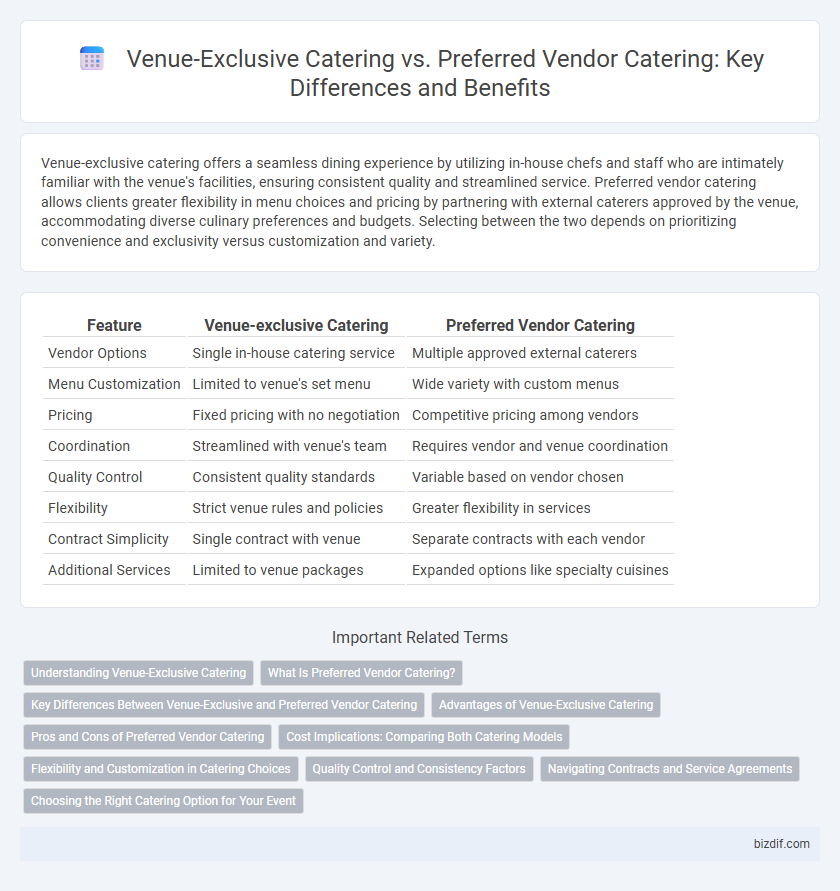Venue-exclusive catering offers a seamless dining experience by utilizing in-house chefs and staff who are intimately familiar with the venue's facilities, ensuring consistent quality and streamlined service. Preferred vendor catering allows clients greater flexibility in menu choices and pricing by partnering with external caterers approved by the venue, accommodating diverse culinary preferences and budgets. Selecting between the two depends on prioritizing convenience and exclusivity versus customization and variety.
Table of Comparison
| Feature | Venue-exclusive Catering | Preferred Vendor Catering |
|---|---|---|
| Vendor Options | Single in-house catering service | Multiple approved external caterers |
| Menu Customization | Limited to venue's set menu | Wide variety with custom menus |
| Pricing | Fixed pricing with no negotiation | Competitive pricing among vendors |
| Coordination | Streamlined with venue's team | Requires vendor and venue coordination |
| Quality Control | Consistent quality standards | Variable based on vendor chosen |
| Flexibility | Strict venue rules and policies | Greater flexibility in services |
| Contract Simplicity | Single contract with venue | Separate contracts with each vendor |
| Additional Services | Limited to venue packages | Expanded options like specialty cuisines |
Understanding Venue-Exclusive Catering
Venue-exclusive catering offers clients a streamlined experience by limiting food and beverage services to the venue's in-house providers, ensuring consistent quality and seamless coordination with venue staff. This arrangement often includes pre-set menus, standardized pricing, and strict vendor guidelines that maintain the venue's brand standards and reduce logistical challenges. Understanding venue-exclusive catering is essential for clients seeking predictable service levels, simplified contract management, and cohesive event execution within the venue's controlled environment.
What Is Preferred Vendor Catering?
Preferred vendor catering refers to a service arrangement where clients choose from a curated list of caterers approved by the event venue, ensuring compliance with venue regulations and consistent quality standards. These caterers have established relationships with the venue, which often results in streamlined coordination, potentially lower fees, and familiarity with the venue's layout and policies. Preferred vendor catering balances client choice with logistical efficiency, benefiting both the venue and event planners by minimizing risks and enhancing the overall catering experience.
Key Differences Between Venue-Exclusive and Preferred Vendor Catering
Venue-exclusive catering requires clients to use the venue's in-house catering service, ensuring seamless coordination and consistent quality control but limiting menu customization and vendor options. Preferred vendor catering allows clients to hire selected external caterers approved by the venue, offering broader menu choices and potentially more competitive pricing while maintaining compatibility with the venue's policies. Key differences include vendor selection control, flexibility in menu design, pricing structures, and overall event coordination dynamics.
Advantages of Venue-Exclusive Catering
Venue-exclusive catering ensures seamless coordination by having a single point of contact, reducing logistical complexities and enhancing event flow. It guarantees consistent quality and presentation, as the catering team is familiar with the venue's facilities and restrictions. This exclusivity often results in cost efficiencies and streamlined communication, offering a more integrated and stress-free catering experience.
Pros and Cons of Preferred Vendor Catering
Preferred vendor catering offers consistent quality and streamlined communication due to established relationships between venues and caterers, enhancing event coordination efficiency. However, this option may limit menu customization and increase costs due to lack of vendor competition, potentially reducing flexibility for clients. Choosing preferred vendors ensures reliability but might compromise on personalized service and pricing competitiveness compared to venue-exclusive catering options.
Cost Implications: Comparing Both Catering Models
Venue-exclusive catering often includes bundled pricing with venue rental, which can simplify budgeting but may limit flexibility and increase overall costs due to mandatory service fees. Preferred vendor catering provides competitive pricing options and customization opportunities but might incur additional charges for external vendor accommodations or coordination fees. Both models require careful evaluation of service inclusions, hidden costs, and contract terms to manage the total catering expenditure effectively.
Flexibility and Customization in Catering Choices
Venue-exclusive catering often limits flexibility by restricting clients to a preset menu and vendor options tied to the location, which can hinder customization for specific dietary needs or event themes. Preferred vendor catering offers greater adaptability, enabling clients to select from a wider array of chefs, menus, and service styles that align with unique preferences and guest requirements. Choosing preferred vendors enhances the ability to tailor the catering experience, ensuring bespoke menus and personalized service that reflect the event's distinct character.
Quality Control and Consistency Factors
Venue-exclusive catering ensures strict quality control and consistency by limiting service to a single provider intimately familiar with the venue's logistical requirements, staff standards, and kitchen facilities. Preferred vendor catering offers customers choice while maintaining standards through vetted partnerships, but variability can arise from differing operational practices and vendor capabilities. Consistent guest experience is more reliably achieved with venue-exclusive catering due to streamlined coordination and unified quality protocols.
Navigating Contracts and Service Agreements
Venue-exclusive catering contracts often require clients to work solely with the venue's in-house culinary team, limiting vendor flexibility but ensuring streamlined service and consistent quality standards. Preferred vendor agreements allow clients to select from a curated list of external catering companies, offering more diverse menu options while maintaining compliance with venue policies. Understanding key contract elements--such as cancellation policies, liability clauses, and service guarantees--is essential for negotiating terms that protect clients' interests and ensure a seamless event experience.
Choosing the Right Catering Option for Your Event
Selecting between venue-exclusive catering and preferred vendor catering depends on factors like budget, menu customization, and event flexibility. Venue-exclusive catering often ensures seamless coordination and guaranteed quality while preferred vendors may offer diverse menus and personalized services. Understanding your event's specific needs allows optimal catering choice that enhances guest experience and event success.
Venue-exclusive Catering vs Preferred Vendor Catering Infographic

 bizdif.com
bizdif.com